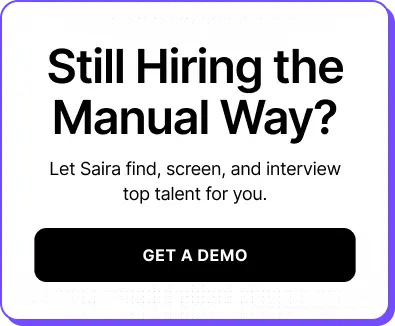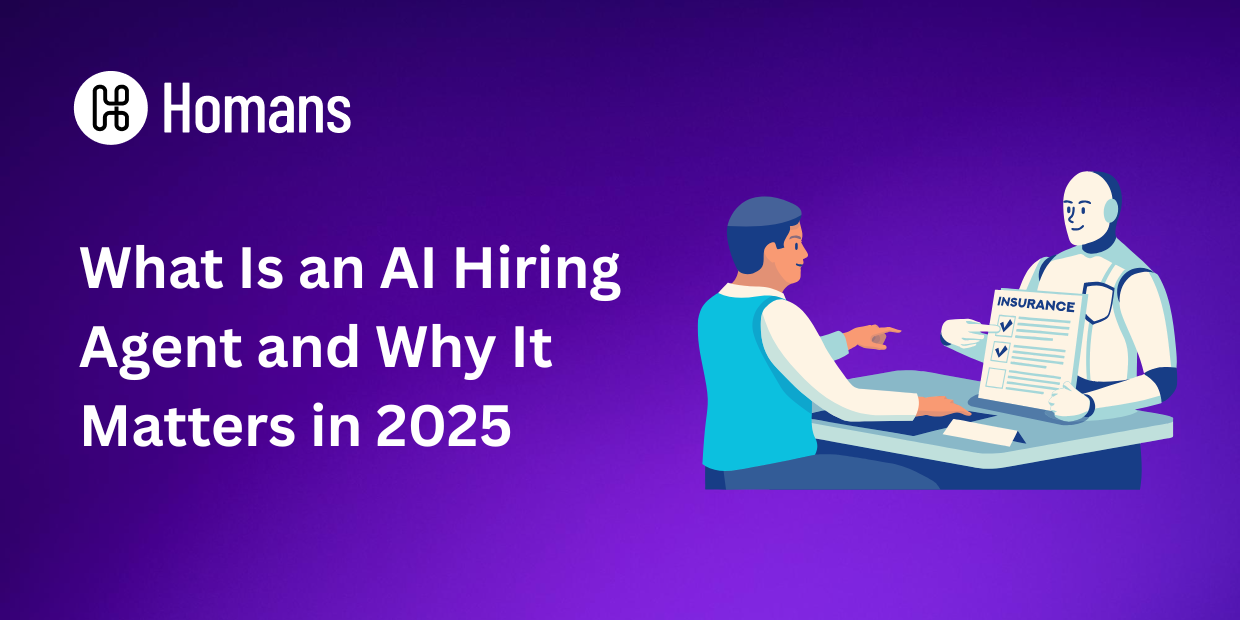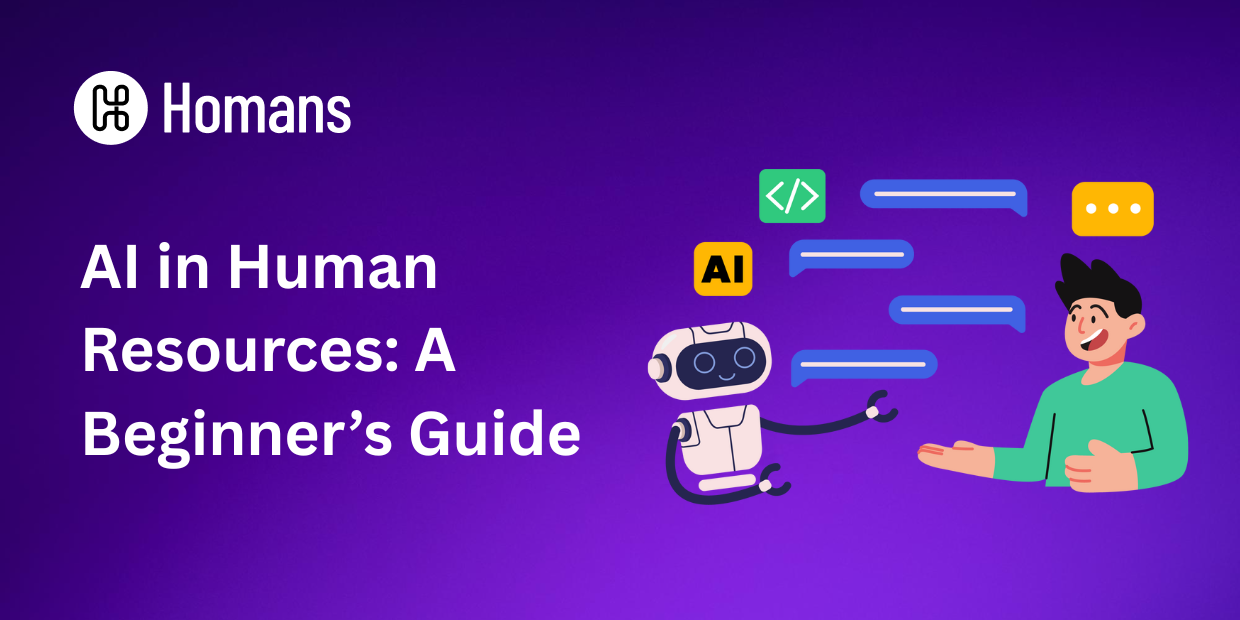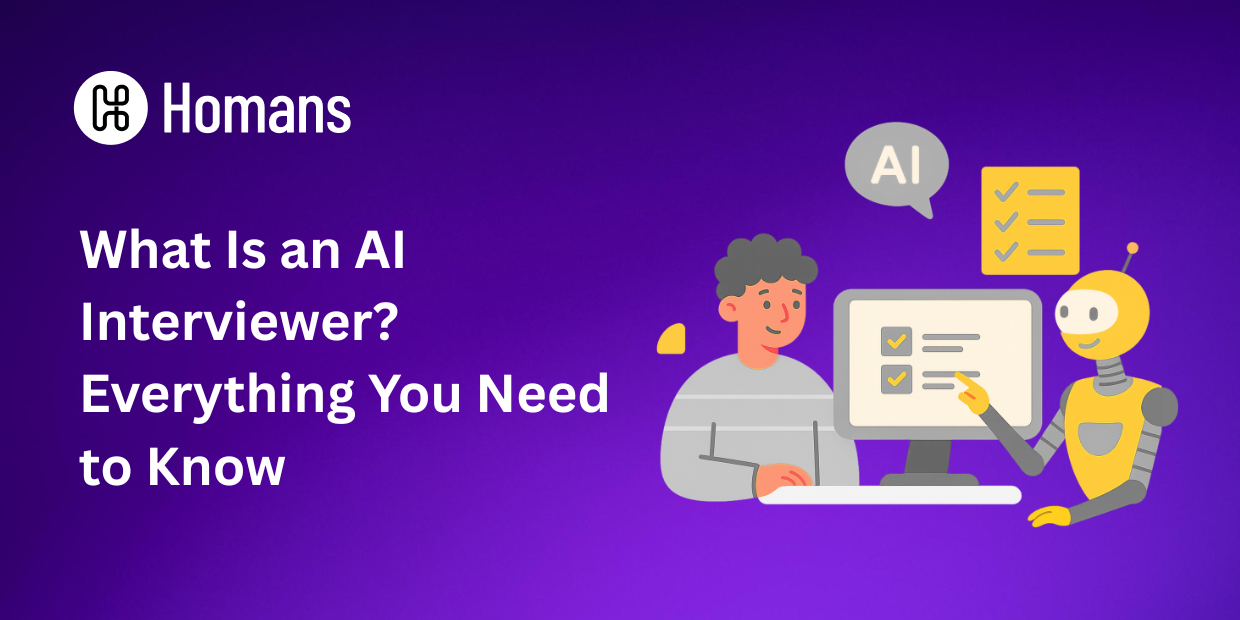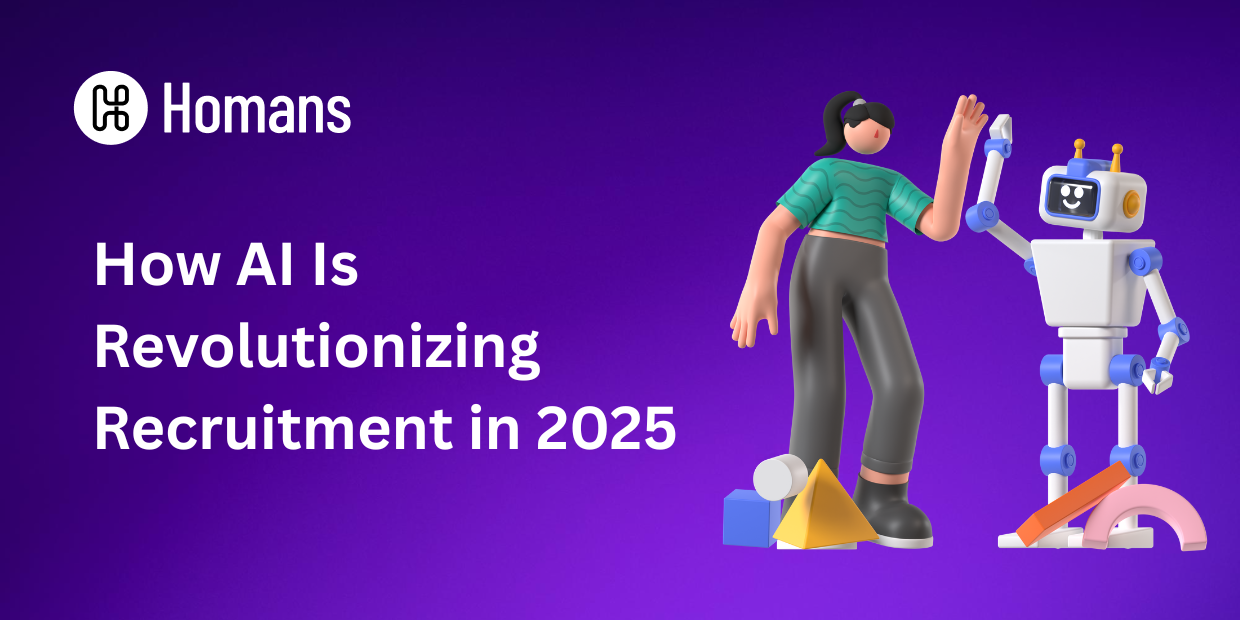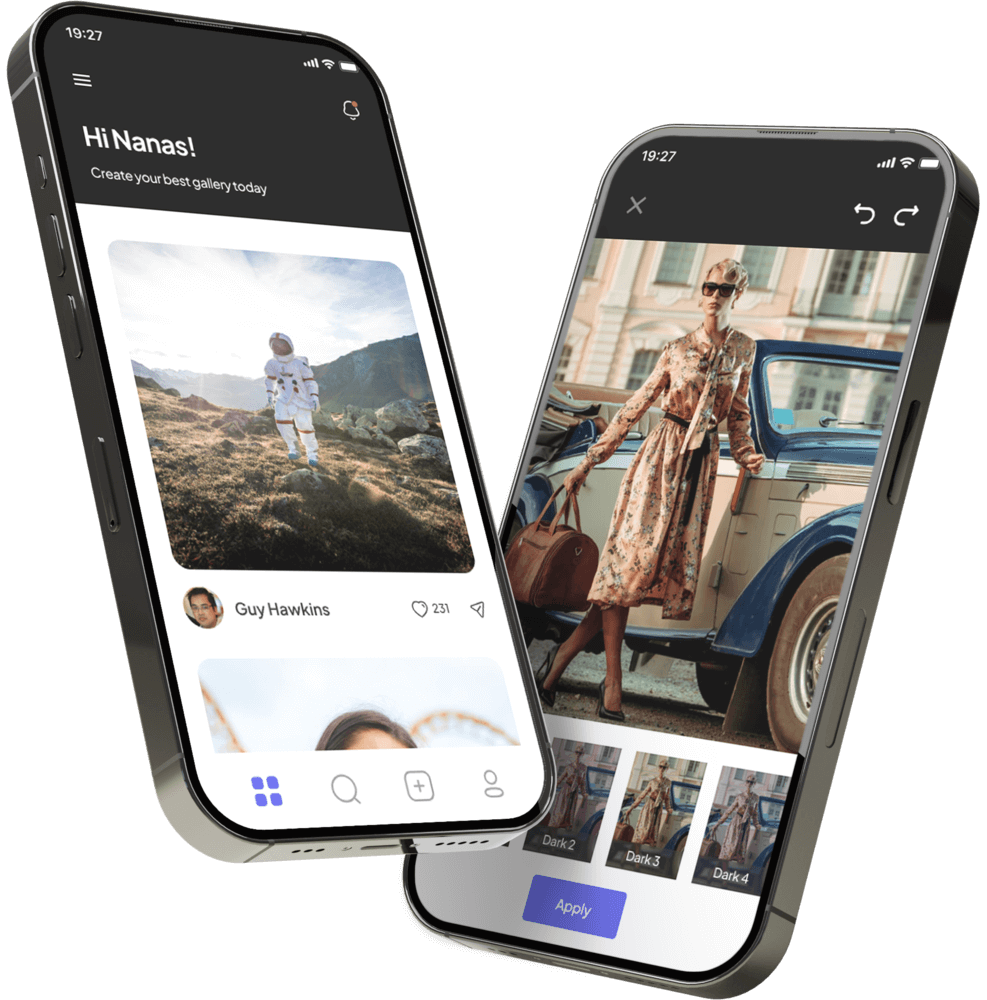The recruitment landscape is experiencing a fundamental transformation in 2025, driven by the rise of AI hiring agent—autonomous, intelligent systems that are revolutionizing how organizations discover, evaluate, and hire talent. As the global AI agents market is projected to reach $7.92 billion in 2025, growing at a remarkable CAGR of 45.82%1, these sophisticated tools are becoming essential for companies seeking to stay competitive in an increasingly challenging hiring environment.
What Is an AI Hiring Agent?
An AI hiring agent is an autonomous, adaptive artificial intelligence system designed to handle recruitment tasks with minimal human intervention2. Unlike traditional recruitment automation tools that follow rigid, predefined rules, AI hiring agents possess advanced capabilities including natural language processing, machine learning, and predictive analytics that enable them to think, learn, and adapt their decisions based on data and feedback3.
These intelligent systems go far beyond basic chatbots or simple automation tools. AI hiring agents can autonomously manage end-to-end recruitment processes, from sourcing and screening candidates to scheduling interviews and providing insights through comprehensive data analysis2. They combine the efficiency of robotic process automation with the natural language processing of chatbots, the trial-and-error learning of machine learning, and the processing power of large language models4.
Key characteristics that distinguish AI hiring agents include:
- Autonomous decision-making: They proactively identify problems and execute solutions without waiting for human instructions2
- Continuous learning: They adapt and improve their performance based on past hiring data and outcomes5
- Contextual reasoning: They can assess candidates beyond keywords, analyzing skills, experience, and cultural fit5
- Multi-task management: They can handle multiple hiring functions simultaneously, from screening to scheduling and follow-ups5
How AI Hiring Agents Work
AI hiring agents leverage a sophisticated technology stack to deliver human-like decision-making capabilities in recruitment processes. At their core, these systems utilize Natural Language Processing (NLP) to understand and interact in human-like language, machine learning algorithms to continuously improve their accuracy, and predictive analytics to forecast candidate success and hiring outcomes3.
The typical workflow of an AI hiring agent encompasses several key functions:
Candidate Sourcing and Discovery
AI agents proactively scour multiple platforms including job boards, LinkedIn profiles, GitHub repositories, and social media networks to identify potential candidates5. They use advanced algorithms to analyze not just active job seekers but also passive candidates who might be perfect fits based on their skills and experience, significantly expanding the available talent pool5.
Intelligent Resume Screening
Moving beyond simple keyword matching, AI hiring agents conduct comprehensive resume analysis that evaluates qualifications, skills, career progression, and even soft skills through writing style analysis and past project evaluation5. This approach reduces false negatives and helps identify high-quality candidates who might be overlooked by traditional screening methods.
Automated Candidate Engagement
These systems provide instant, 24/7 responses to candidate inquiries, offering information about job roles, company culture, and application status3. Through sophisticated chatbot technology, they can handle complex conversations while maintaining a personal touch that enhances the candidate experience.
Interview Coordination and Management
AI agents efficiently manage interview scheduling by synchronizing with multiple calendars, reducing conflicts and delays. They can also send automated reminders, handle rescheduling requests, and even conduct initial screening interviews using advanced conversational AI3.
Why AI Hiring Agents Matter in 2025
The adoption of AI hiring agents addresses several critical challenges facing modern recruitment teams. According to recent industry data, 79% of organizations now use AI to enhance efficiency and accuracy in their hiring processes6, with 85% of enterprises expected to implement AI agents by 20257.
Solving Critical Efficiency Problems
Traditional recruitment processes are plagued by inefficiency. Recruiters spend an average of 23 hours per role manually reviewing resumes, yet 75-88% of applicants don’t meet the required qualifications8. AI hiring agents can dramatically reduce these inefficiencies, with organizations reporting time-to-hire reductions of 30-75% through automated processes9.
The impact on productivity is substantial. Companies using AI recruitment tools report:
- 85% reduction in time-to-hire on average10
- 60% reduction in scheduling time10
- 45% reduction in manual administrative work10
- 30-40% direct cost-per-hire reduction10
Addressing the Talent Shortage Crisis
With 1.26 million job vacancies in the UK alone and 69% of employers struggling to fill positions9, AI hiring agents provide a solution for scaling recruitment efforts without proportionally increasing human resources. These systems enable organizations to process larger volumes of applications while maintaining or improving quality standards.
Enhancing Candidate Experience
In an environment where 65% of job seekers report inconsistent communication during hiring processes, leading 82% to lose trust in employers8, AI hiring agents provide consistent, immediate responses and transparent communication throughout the recruitment journey. This 24/7 availability and instant feedback capability significantly improves the candidate experience, which is crucial when 66% of candidates say a positive experience influences their decision to accept a job offer11.
Key Benefits of AI Hiring Agents
Speed and Scalability
AI hiring agents can process thousands of applications in minutes, performing tasks that would take human recruiters days or weeks. This speed advantage is crucial in competitive talent markets where top candidates are off the market within 10 days5.
Bias Reduction and Improved Diversity
By assessing candidates based on skills, qualifications, and experience rather than subjective factors, AI hiring agents help eliminate unconscious biases that often influence human hiring decisions3. This leads to more objective recruitment processes and fosters greater diversity and equality in hiring outcomes.
Cost Efficiency
Organizations implementing AI hiring agents typically see significant cost savings. Companies report saving thousands of dollars per hire by reducing reliance on external agencies and enabling more efficient internal processes9. For example, Nestlé saved 8,000 hours per month using AI recruitment tools, while General Motors cut $2 million in hiring costs8.
Data-Driven Decision Making
AI hiring agents continuously learn from past hiring data, providing valuable insights into recruitment patterns, candidate preferences, and process improvements3. This data-driven approach enables more strategic hiring decisions and helps organizations optimize their recruitment strategies over time.
24/7 Availability and Global Reach
Unlike human recruiters, AI agents operate around the clock, engaging with candidates across different time zones and ensuring no potential hire is missed due to timing constraints3. This capability is particularly valuable for organizations with global operations or those hiring for remote positions.
Current Market Landscape and Adoption
The AI recruitment market is experiencing explosive growth. The global AI agents market, valued at $5.43 billion in 2024, is forecasted to reach $236.03 billion by 20341. Within human resources, 70% of companies experimenting with AI or GenAI are doing so within HR, with talent acquisition being the top use case12.
Leading organizations are already seeing significant returns on their AI investments. 92% of firms using AI in recruitment report seeing benefits, with more than 10% reporting productivity gains of +30%12. The most popular use cases include:
- Content creation (job descriptions, marketing emails, assessments) – 70% of companies
- Administrative tasks (interview scheduling, communication) – 70% of companies
- Candidate matching (skills-based pairing with job specifications) – 54% of companies12
Implementation Challenges and Best Practices
Common Implementation Challenges
Despite the clear benefits, organizations face several challenges when implementing AI hiring agents:
Bias in Training Data: AI algorithms can perpetuate biases present in historical hiring data, potentially leading to unfair candidate selection13. Regular algorithm audits and diverse training datasets are essential to mitigate this risk.
Data Privacy and Compliance: Handling sensitive candidate data raises privacy concerns, particularly with regulations like GDPR and CCPA. Organizations must ensure robust data protection measures and transparent AI usage policies14.
Integration Complexity: Many organizations struggle with integrating AI tools with existing HR systems. 45% of companies cite integration challenges as a major obstacle15.
Over-reliance on Automation: While AI can handle many tasks efficiently, maintaining human judgment for cultural fit assessment and complex decision-making remains crucial14.
Best Practices for Successful Implementation
Start with Clear Objectives: Define specific goals such as reducing time-to-hire, improving candidate matching, or enhancing diversity before selecting AI tools14.
Ensure Data Quality: Use clean, comprehensive, and unbiased datasets to train AI models. Include diverse and representative data to prevent reinforcing historical biases14.
Maintain Human Oversight: Use AI for repetitive, data-intensive tasks while retaining human involvement for critical decisions like cultural fit assessment and final interviews14.
Invest in Training: Comprehensive staff training on AI tools, their limitations, and best practices for interpreting AI-generated insights is crucial for successful adoption16.
Implement Gradually: Rather than deploying AI across all processes simultaneously, start with pilot programs focused on specific job categories or recruitment stages17.
The Future of AI Hiring Agents
Looking ahead, 2025 is positioning itself as the year of AI agents18, with several key trends emerging:
Multi-Agent Collaboration
Organizations will increasingly deploy multiple specialized AI agents that work together to handle complex recruitment challenges. These multi-agent systems will collaborate to tackle high-impact problems like building comprehensive hiring campaigns that traditionally require multiple business disciplines19.
Enhanced Predictive Capabilities
AI hiring agents will become more sophisticated in predicting candidate success, job performance, and cultural fit, moving beyond traditional screening to provide strategic insights about long-term hiring outcomes10.
Integration with Broader HR Ecosystems
Future AI hiring agents will seamlessly integrate with comprehensive HR platforms, providing end-to-end talent management solutions that extend from recruitment through onboarding and employee development11.
Regulatory Adaptation
As AI adoption in hiring increases, organizations will need to navigate evolving legal frameworks. Several jurisdictions are implementing AI regulations in recruitment, making compliance and transparency increasingly important6.
Measuring ROI and Success
Organizations implementing AI hiring agents should establish clear metrics to measure success:
Efficiency Metrics:
- Time-to-fill reduction (industry average: 85% improvement)
- Screening time per candidate
- Recruiting team productivity (requisitions handled per recruiter)
Quality Indicators:
- Submission-to-interview ratio improvement
- New hire retention rates at 90/180/365 days
- Hiring manager satisfaction scores
Cost Management:
- Direct cost-per-hire reduction (typically 30-40%)
- Technology cost relative to recruitment volume
- Reduced reliance on external recruitment agencies10
Conclusion
AI hiring agents represent a fundamental shift in how organizations approach talent acquisition. As the technology matures and adoption accelerates throughout 2025, these intelligent systems are becoming essential tools for competitive hiring. The combination of improved efficiency, cost savings, enhanced candidate experience, and data-driven insights makes AI hiring agents not just a technological advancement, but a strategic imperative for modern organizations.
Success with AI hiring agents requires thoughtful implementation, ongoing optimization, and a balanced approach that leverages AI’s strengths while maintaining the human elements that make recruitment fundamentally about connecting the right people with the right opportunities. Organizations that embrace this technology thoughtfully and strategically will be best positioned to attract and retain top talent in an increasingly competitive marketplace.
The future of recruitment is not about replacing human recruiters, but about empowering them with intelligent tools that handle routine tasks while freeing them to focus on relationship building, strategic thinking, and the nuanced aspects of talent evaluation that require human insight. As we move deeper into 2025, AI hiring agents will become as fundamental to recruitment as applicant tracking systems are today—not just nice-to-have tools, but essential infrastructure for effective talent acquisition.

